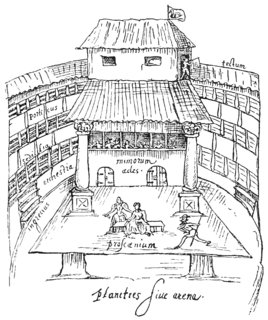
English Renaissance theatre, also known as Renaissance English theatre and Elizabethan theatre, refers to the theatre of England between 1558 and 1642.

King Lear is a tragedy written by William Shakespeare. There are two versions, but modern editors usually conflate these to produce a single play.
The Master of the Revels was the holder of a position within the English, and later the British, royal household, heading the "Revels Office" or "Office of the Revels". The Master of the Revels was an executive officer under the Lord Chamberlain. Originally he was responsible for overseeing royal festivities, known as revels, and he later also became responsible for stage censorship, until this function was transferred to the Lord Chamberlain in 1624. However, Henry Herbert, the deputy Master of the Revels and later the Master, continued to perform the function on behalf of the Lord Chamberlain until the English Civil War in 1642, when stage plays were prohibited. The office continued almost until the end of the 18th century, although with rather reduced status.

James Shirley was an English dramatist.

Traditional Chinese opera, or Xiqu, is a form of musical theatre in China with roots going back to the early periods in China. It is an amalgamation of various art forms that existed in ancient China, and evolved gradually over more than a thousand years, reaching its mature form in the 13th century, during the Song dynasty (960–1279). Early forms of Chinese theater are simple, but over time they incorporated various art forms, such as music, song and dance, martial arts, acrobatics, costume and make-up art, as well as literary art forms to become traditional Chinese opera.
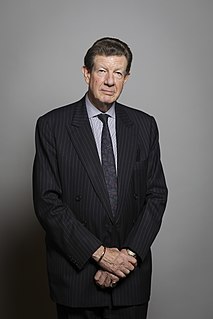
The Lord Chamberlain or Lord Chamberlain of the Household is the most senior officer of the Royal Household of the United Kingdom, supervising the departments which support and provide advice to the Sovereign of the United Kingdom while also acting as the main channel of communication between the Sovereign and the House of Lords. The office organises all ceremonial activity such as garden parties, state visits, royal weddings, and the State Opening of Parliament. They also handle the Royal Mews and Royal Travel, as well as the ceremony around the awarding of honours.
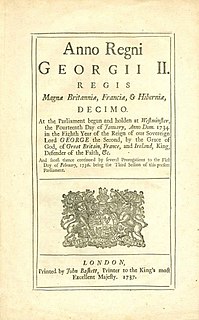
The Licensing Actof 1737 is a defunct Act of Parliament in the Kingdom of Great Britain, and a pivotal moment in theatrical history. Its purpose was to control and censor what was being said about the British government through theatre. The act was modified by the Theatres Act 1843 and was finally named as the Theatres Act 1968. The Lord Chamberlain was the official censor and the office of Examiner of Plays was created under the Act. The Examiner assisted the Lord Chamberlain in the task of censoring all plays from 1737–1968. The Examiner read all plays which were to be publicly performed, produced a synopsis and recommended them for licence, consulting the Lord Chamberlain in cases of doubt.

West End theatre is mainstream professional theatre staged in the large theatres in and near the West End of London. Along with New York City's Broadway theatre, West End theatre is usually considered to represent the highest level of commercial theatre in the English-speaking world. Seeing a West End show is a common tourist activity in London.

The Theatres Act 1968 abolished censorship of the stage in the United Kingdom, receiving royal assent on 26 July 1968, after passing both Houses of Parliament.
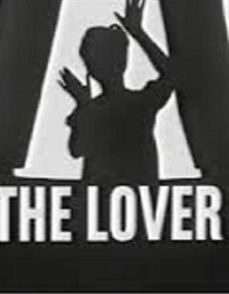
The Lover is a 1962 one-act play by Harold Pinter, originally written for television, but subsequently performed on stage. The play contrasts bourgeois domesticity with sexual yearning.
The patent theatres were the theatres that were licensed to perform "spoken drama" after the Restoration of Charles II as King of England, Scotland and Ireland in 1660. Other theatres were prohibited from performing such "serious" drama, but were permitted to show comedy, pantomime or melodrama. Drama was also interspersed with singing or dancing, to prevent the whole being too serious or dramatic.
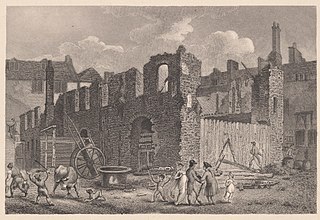
Gibbon's Tennis Court was a building off Vere Street and Clare Market, near Lincoln's Inn Fields in London, England. Originally built as a real tennis court, it was used as a playhouse from 1660 to 1663, shortly after the English Restoration. As a theatre, it has been variously called the "Theatre Royal, Vere Street", the "Vere Street Theatre", or simply "The Theatre". It was the first permanent home for Thomas Killigrew's King's Company and was the stage for some of the earliest appearances by professional actresses.

Early Morning is a surrealist farce by the English dramatist Edward Bond. It was first produced in 1968, opening on 31 March at the Royal Court Theatre, directed by William Gaskill. The play takes place in a contorted version of the court of Queen Victoria who is portrayed as a lesbian. Her two sons are made conjoined twins. This made the play extremely scandalous, as did a scene in which the character Len eats another person standing in a queue in front of him. Like Bond’s earlier play Saved (1965), it was initially condemned but later came to be viewed positively.
The Gingerbread Lady is a play by Neil Simon. It was widely believed to have been written specifically for actress Maureen Stapleton, who won both the Tony Award and Drama Desk Award for her performance. But in a later autobiography, Simon wrote that he'd feared Stapleton might be "hurt" if she assumed the character's flaws and personal damage were a direct dramatization of her life. Simon said that it was director Mike Nichols' suggestion to cast Stapleton in the role, and that Simon responded, "This is not really Maureen. It's ten, twenty different actresses I've met over the years."

The Theatres Act 1843 is a defunct Act of Parliament in the United Kingdom. It amended the regime established under the Licensing Act 1737 for the licensing of the theatre in Great Britain, implementing the proposals made by a select committee of the House of Commons in 1832.

Thousands of performances of William Shakespeare's plays have been staged since the end of the 16th century. While Shakespeare was alive, many of his greatest plays were performed by the Lord Chamberlain's Men and King's Men acting companies at the Globe and Blackfriars Theatres. Among the actors of these original performances were Richard Burbage, Richard Cowley, and William Kempe.

Theatre of United Kingdom plays an important part in British culture, and the countries that constitute the UK have had a vibrant tradition of theatre since the Renaissance with roots going back to the Roman occupation.
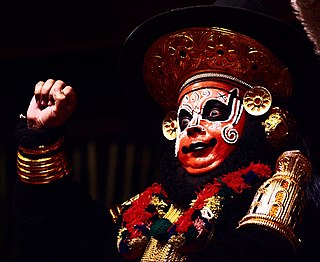
The history of theatre charts the development of theatre over the past 2,500 years. While performative elements are present in every society, it is customary to acknowledge a distinction between theatre as an art form and entertainment and theatrical or performative elements in other activities. The history of theatre is primarily concerned with the origin and subsequent development of the theatre as an autonomous activity. Since classical Athens in the 6th century BC, vibrant traditions of theatre have flourished in cultures across the world.

Theatre in Scotland refers to the history of the performing arts in Scotland, or those written, acted and produced by Scots. Scottish theatre generally falls into the Western theatre tradition, although many performances and plays have investigated other cultural areas. The main influences are from North America, England, Ireland and from Continental Europe. Scotland's theatrical arts were generally linked to the broader traditions of Scottish and English-language literature and to British and Irish theatre, American literature and theatrical artists. As a result of mass migration, both to and from Scotland, in the modern period, Scottish literature has been introduced to a global audience, and has also created an increasingly multicultural Scottish theatre.
Caryl Churchill is a British playwright known for dramatising the abuses of power, for her use of non-naturalistic techniques, and for her exploration of sexual politics and feminist themes. Celebrated for works such as Cloud 9 (1979), Top Girls (1982), Serious Money (1987), Blue Heart (1997), Far Away (2000), and A Number (2002), she has been described as "one of Britain's greatest poets of and innovators for the contemporary stage". In a 2011 dramatists' poll by The Village Voice, five out of the 20 polled writers listed Churchill as the greatest living playwright.














